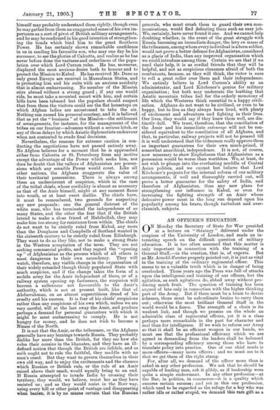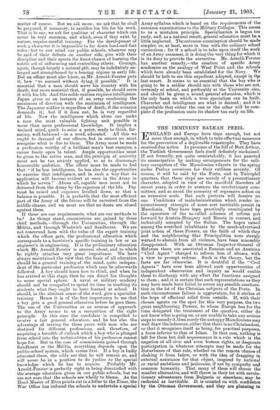O N Monday the Secretary of State for War presided at
a lecture on " Strategy " delivered under the auspices of the University of London, and made an in- teresting speech on the difficult question of military education. It is too often assumed that this matter is only important in connection with the training of a General Staff,—in the creation, that is, of experts. But as Mr. Arnold-Forster properly pointed out, it is just as vital in the training of the ordinary regimental officer. This seems to us a valuable truth which is in danger of being overlooked. Three years ago the Press was full of attacks upon the intelligence and training of our officers, but the agitation, as such agitations do, ebbed away without pro- ducing much fruit. The question of training has been argued of late only in connection with the higher thinking part of the Army. But if there must be a brain to devise schemes, there must be subordinate brains to carry them out; otherwise the most brilliant General Staff in the world would be a fiasco. The strength of a chain is its weakest link, and though we possess on the whole an admirable class of regimental officers, yet it is a class perhaps more remarkable in the past for character and zeal than for intelligence. If we wish to reform our Army so that it shall be an efficient weapon in our hands, we must see that the professional efficiency which we are agreed in demanding from the leaders shall be balanced by a corresponding efficiency among those who have to translate policy into practice. One of our chief needs is more officers—many more officers : and we must see to it that we get them of the right stamp.
For, after all, we demand of the officer more than is asked in any other profession. We ask that he should be capable of leading men, ask it glibly, as if leadership were quite a simple endowment. In any other profession—at the Bar, in politics, in commerce—it is a quality which ensures certain success ; and yet in this one profession, which used to be regarded as the refuge for a boy who was rather idle or rather stupid, we demand this rare gift as a matter of course. But we ask more ; we ask that he shall be prepared, if necessary, to sacrifice his life for his work. That is to say, we ask for qualities of character which can never be very common, and which, even if they exist by nature, require careful training. For the development of such a character it is impossible to lay down hard-and-fast rules but to our mind our public schools, whatever may be said of their defects on another side, give with their discipline and their sports the finest chance of learning the subtle art of influencing and controlling others. Courage, again, though largely a natural gift, may be indefinitely en- larged and strengthened by a bracing regime in early life. But an officer must also know, as Mr. Arnold-Forster puts it, how " to succeed without dying, if possible." It is essential that a man should serve his country with his death, but more essential that, if possible, he should serve it with his life. And this noble caution requires intelligence. Japan gives us an instance of an army combining the maximum of devotion with the maximum of intelligence. The Japanese soldier is regardless of death, if the occasion demands it; but if it does not, he is very regardful of life. Now the intelligence which alone can make a man the most valuable fighting unit possible is more than mere professional knowledge. It implies a trained mind, quick to seize a point, ready to think, far- seeing, well-balanced —in a word, educated. All this we ought to demand of our officers, but in return we must recognise what is duo to them. The Army must be made a profession worthy of a brilliant man's best energies, a career freely open to talent. Ample opportunities must be given to the active man, and the principle of seniority must not be too strictly applied, so as to discourage honourable ambition. The officer must be made to feel that " if he has intelligence, he has also the opportunities to exercise that intelligence, and in such a way that its application will become evident at once in the Army in which he serves." Above all, capable men must not be debarred from the Army by the expenses of the life. Pay must be raised and expenses levelled down, so that a balance is possible. It is probable that the most efficient part of the Army of the future will be recruited from the middle classes, and we must see that no doors are closed against them. If these are our requirements, what are our methods to be ? As things stand, commissions are gained by three chief methods,—through the Universities, through the Militia, and through Woolwich and Sandhurst. We are not concerned here with the value of the expert training which the officer gets, the professional education which corresponds to a barrister's specific training in law or an engineer's in engineering. It is the preliminary education which Mr. Arnold-Forster is anxious about, and to which he rightly attaches very great importance. We have always maintained the view that the basis of all education should be a general training of the mind, quite indepen- dent of the particular profession which may be afterwards followed. A boy should learn how to think, and when he has arrived at this stage, then he can direct his thoughts to some special sphere. A naval or military academy should not be compelled to spend its time in teaching its students what they ought to have learned at school. It should, in the strictest sense of the word, give a specialist training. Hence it is of the first importance to see that a boy gets a. good general education before he goes there. The use of the Universities as an avenue of approach to the Army seems to us a recognition of the right principle. In this case the candidate is compelled to receive a fair general education, and he has also the advantage of mixing for three years with men who are destined for different professions, and, therefore, of acquiring a breadth of outlook which a boy who is plunged from school into the technicalities of his profession cannot hope for. But in the case of commissions gained through Sandhurst or the Militia, everything depends upon the public-school system, which comes first. If a boy is badly educated there, the odds are that he will remain so, and will never be in a position to do justice to the special knowledge which he has to acquire. Probably Mr. irnold-Forster is perfectly right in being dissatisfied with the average education given in our public schools, but we are not sure that the schools are wholly to blame. As the Head-Master of Eton points out in a letter to the Times, the War Office has induced the schools to undertake a special Army syllabus which is based on the requirements of the entrance examinations to the Military Colleges. This seems to us a mistaken principle. Specialisation is begun too early, and, as a natural result, general education must be a. little neglected. The entrance examination should be made simpler, or, at least, more in line with the ordinary school curriculum ; for if a school is to take upon itself the work of an Army crammer, it is doing the very thing for which it is its duty to provide the corrective. Mr. Arnold-Forster has another remedy,—the creation of specific Army academies on the analogy of West Point and the schools which have already been established for the Navy. We should be loth to see this expedient adopted, except in the last resort. It seems to us essential that the boy who is going to be a soldier should mix with those who are not, certainly at school, and preferably at the University also, and should be given a. sound general education, which is the only basis on which a true specialism can be built. Character and intelligence are what is desired ; and it is improbable that either the one or the other will be com- plete if the profession casts its shadow too early on life.







































 Previous page
Previous page